Meat: To Eat, Or Not To Eat? (That is the question)
(This is reposted from my website)
Eating meat is controversial when following the advice of natural health experts. Some of them say it’s good for you; some of them say it’s bad for you. The choice of whether or not to eat it is up to you. There are ethical and health reasons to support each view. You’ll have to figure out where you stand on the issue and determine the best way that works for you.
Factory-Farmed Animals
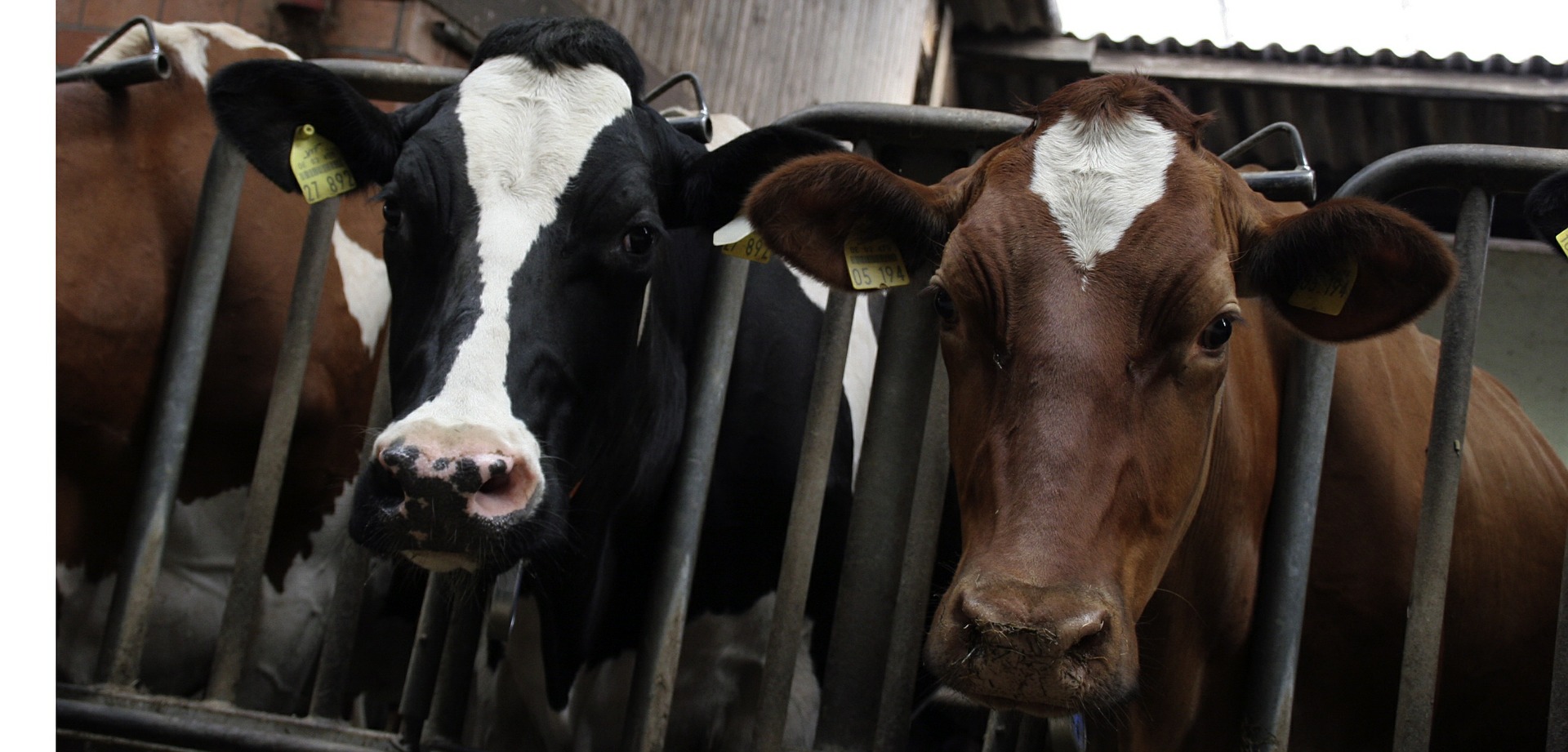
Like many of the other problems we’re facing today, meat production has been industrialized and is therefore far from natural. The further we step away from nature the more trouble we get into. Factory farming animals pollutes the planet with animal waste laden with antibiotics that taint our food and water supply. The animals are given growth hormones to boost profits with no concern for human health. Up to 80% of all antibiotics produced are given to livestock. It’s a catastrophic health and environmental disaster. The animals are raised in inhumane conditions that would be like living in hell as humans. So who wins? Only the huge meat and poultry producers that profit from it win.
There are health and ethical reasons to not eat factory farmed animals. If you're going to eat meat, eat meat that was raised naturally. It’s better for the animals, the planet, and us humans that eat it.
“The greatness of a nation can be judged by the way its animals are treated.”
- Mahatma Gandhi
Why You Shouldn't Eat Meat
There are good reasons for someone to choose not to eat meat. The meat that most people are eating is of very poor quality. We eat too much of it too. I ate meat with every meal until I was 25. I didn't consider it a meal if it didn't have meat in it. The sad thing is far too many people still think like this today.
The China Study
Protein was once thought of to be a super nutrient and meat became synonymous with protein. One of the most notable books responsible for many people going vegan is The China Study

Diet For A New America
John Robbins wrote Diet for a New America
We're so disconnected from animals, nature, and the food industry, that we're completely disconnected from the food that we eat. I remember being a kid and sometimes thinking about the fact that I was eating a dead animal and it grossed me out. I'd have to force myself to change what I was thinking about so I could stomach it. But everyone else ate meat all day so I did too.
Diet For A New America exposed what it's like where animals are factory farmed. Earthlings is an eye-opening documentary that goes even further giving you the brutal truth about how animals are inhumanely treated. Warning: it's extremely graphic and hard to watch.
Where I Stand With Eating Meat
I used to be a big-time meat eater. I'd order the meat lovers pizza and everything! After being on my health journey for some time I began to question eating meat. I watched Foodmatters
After a few years of being vegetarian, I slowly began to introduce meat back into my diet and now I just focus on eating a small amount of quality meat. Why? Because meat has nutrients in it that are hard to get from plant-based foods. Long-chain omega-3s are essential to good health, and they're almost exclusively found in animal products (with the notable exceptions of blue-green algae and marine phytoplankton, which aren't common foods). To me, meat seems to be part of a balanced diet.
Humans are scavengers, omnivores. While weren't not perfectly suited for eating meat, like a carnivore would be, we certainly can eat and likely always will. I don't wish for the whole world to stop eating meat. That's not realistic. Whenever trying to create solutions for the world you have to be pragmatic. Not everyone is going to go vegetarian, nor should they. New science is indicating that some blood types do better with meat than others. Type O blood types seem to handle eating meat the best.
Besides health concerns, the only other reason to consider not eating meat is because of your ethics. What most people don't realize is that domesticated animals will have a very tough time surviving in the wild without human intervention. For example, cows are domesticated animals that come from the now extinct wild ox. While the wild ox could survive without us, cows cannot. If we stop eating them and stop using them for their milk they'll have no way to survive as a species. We need to raise them humanely with love and care. That's more realistic, and it's better for them, us, and the environment.
Allan Savory gave an exceptional TED Talk showing how raising cattle can help save the world. More specifically, how raising them naturally can help build the soil, and even reclaim land so disturbed it's desert. If animals are raised happily and it heals the planet in the process, I don't see much reason to avoid animal products due to ethics. It's irrational to advocate against using all animal products. Vegans go as far as refusing to eat honey, even though it doesn't involve killing and bees make more than enough honey. Plus, animal products can be a good source of nutrition, particularly healthy fats and fat-soluble vitamins.
Naturally Raised Meat Is Nutritious
One the other hand, meat can be packed with nutrition, especially when properly raised. Beef, fish, and eggs, in general, are among the healthiest animal products. However, quality is of the upmost importance. While eating factory farmed cattle, poultry, and fish is unhealthy, when they’re raised naturally they can actually be quite healthy. Animals raised naturally tend to have more nutrition, especially higher levels of the very beneficial long-chain omega-3s DHA and EPA.
Grass-fed Beef
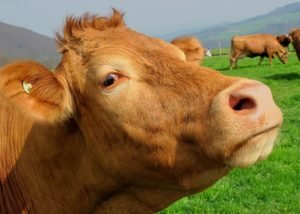
Because the U.S. government heavily subsidizes GMOs, cows are largely fed GMO feed on feedlots, which is also bad for them, the planet, and us. Cows eat grass in nature so if they’re grass-fed and grass-finished, they’re much healthier and therefore much healthier for us to eat.
Because more people are becoming aware of the importance in eating grass-fed beef, companies are capitalizing on the trend by using “grass-fed” merely as marketing term. They’re feeding the cows grass early in life so they can market the meat as “grass-fed” but then the cows are later fed GMO grains just before being slaughtered, which is greatly detrimental to the beef’s nutrient profile.
Grass-finished beef comes from cattle that have been raised on a forage diet their entire lives. Grass-finished beef is healthier to eat because it’s more nutrient rich, including higher amounts of omega-3s. Most people eat too many omega- 6s and not enough omega-3s, so eating more grass-finished beef will help keep you in balance.
Fish
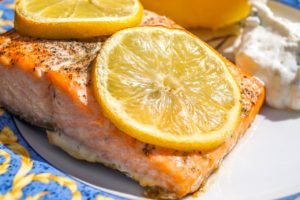
Though some fish are healthier than others, wild fish are generally healthy but there is a growing concern for the mercury levels in the ocean water due primarily to coal power plants. Wild caught Alaskan and sockeye salmon are at top of the list of the healthiest fish due to their relatively low risk for mercury contamination and their high amount omega-3s. As of this writing, neither of them are allowed to be farmed so they’re both always wild-caught.
Always cook fish thoroughly to kill all parasites in it. Be careful because there are lots of scams going on in the fish industry. They named GMO salmon “wild caught” to deceive consumers into thinking it’s actually wild caught and therefore healthy. A lot of the fish on the market is farm-raised, and a lot of shrimp and tuna sold isn’t really shrimp or tuna. The regulatory agencies assigned with protecting us from practices like these generally do the opposite of what they’re supposed to do.
Eggs

Chickens are similar to cows because they too eat grass in nature, as well as bugs and other things. They’re also similar to beef and fish in the sense that eggs are misleadingly marketed. They’re often sold as “free range” and “cage free,” which mean almost nothing because of lack of strict guidelines for such terms. Unfortunately, most eggs are mass-produced in unnatural ways, which makes them inferior true pasture-raised eggs. Pasture-raised eggs are one of healthiest foods, particularly the raw egg yolk. When hens are allowed to be truly pasture raised and eat grass, insects, and other things nature in their diet, they’re eggs are significantly higher in vitamin A, omega-3s, vitamin E, and beta carotene. You can usually tell when an egg has been pasture-raised because the egg yolk will be more bold in color, often taking on an orange color instead of yellow. The orange color is prominent when a lot of beta carotene is present, indicating a natural diet.
Eggs are a great source of lutein and zeaxanthin, which are carotenoids that are very beneficial for the eyes and may help prevent macular degeneration, the leading cause of blindness. The lecithin in eggs is high in choline, which is essential for brain development. Eggs are nutrition powerhouses, especially beneficial for pregnant mothers and young children. Just remember to cook the whites but not the yolk. Over easy eggs are best, but poached eggs work well too.
Best Practices For Eating Meat
If you’re going to eat meat, choose the highest quality meat you can. To take things a step further to maximize health benefits, practice good food combining by not eating your meats with a starch. That means eating your steak with a green vegetable instead of a potato. Burgers clearly violate food-combining principles because of the bun. If you’re a steak lover, take this as a sign to eat more steak. Better yet, chew the steak until all the nutrition in the juices is gone and then spit out whatever is left. This will greatly decrease the transit time it takes you to eliminate your food after you eat it. It also helps with food combining and decreases the amount of energy your body needs to spend to turn your steak into energy. You don’t want that flesh sitting in your digestive tract if it doesn’t have to.
Cook Meat At A Lower Temperature
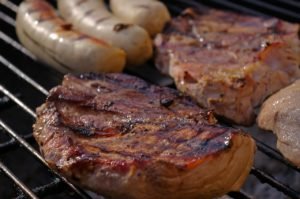
Remember to cook your meat at a lower temperature. Cooking meat a high temperatures creates carcinogens, including heterocyclic amines. When the fat and juices from meat are burned from an open flame, such as when grilling, polycyclic aromatic hydrocarbons are produced on the outside of the meat. Don’t allow your meat to burn on the outside because it’s very toxic. Cook your meat below 320° whenever possible and season it with rosemary, sage, oregano, or other herbs to protect the healthy fats (omega-3s) from oxidation.
(Disclaimer: I will receive an affiliate commission if you click on some of these links and buy something. I appreciate your support and want to ensure you that I would only link to stuff I personally recommend and think you'll benefit from.)
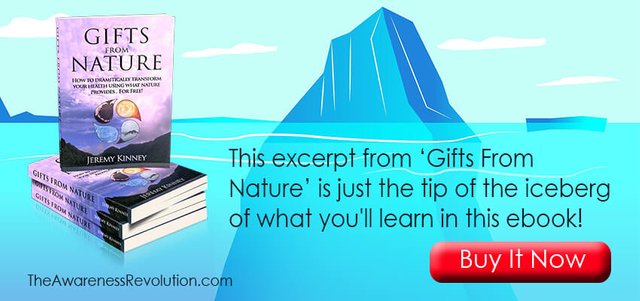
There really aren't any pros to eating meat. It's just stimulation and pleasure, which will numb you from other simple and sweet pleasures of life. If you cannot liquefy it (the meat / flesh), you cannot bring much of it into your blood. Which means you do not assimilate it. Basically, you do not assimilate animal flesh. It's a waste. It's crap--literally :) Don't believe me? Try this...
As for the latter, I completely recommend it. Eat only the fruit. It will not jeopardize your life.
This comment is, of course, an example. I hope it helps and makes sense! :)
In the real world no one is going to live exclusively on meat. Another problem is not everyone is going to go vegan. There are going to be meat eaters, even if it's bad for them and the planet.
That's why I think it's wise to teach THOSE people that healthy animals are healthier to eat, and good for the planet.
Still, there really aren't any pros to eating meat. That's fine if people choose to live under the illusion that flesh is beneficial to them. Still no pros no matter how one stretches and excuses it.
"Healthy animals are healthy to eat" is still a lie--it doesn't matter how healthy the animal is, the acidity still burns up your electrolytes, denatures the surface of your intestinal lining, dehydrates you, putrefies in your gut, etc. That degrades your health; it does not improve your health.
"Killing animals is good for the planet"--in the context of civilized and systematic meat production to grocery outlets, this is absolutely a lie, too. There's the pollution output from industry vehicles to transport the meat, there's the psychological impact on butchers, there's the degraded emotional state from worse health on the individual that lessens their love potential for the earth and humanity (thus inhibiting peace) -- this degrades society's health; society's health and priority of the planet is of high importance for healing the planet.
The truth: there are zero pros to eating meat.
You are ignorring the fact that people are going to eat meat, no matter how bad it is for them and no matter what you say. My point is that it's unrealistic to have the goal of everyone being vegan, because it's never going to happen.
It sounds like you didn't read my post because you haven't commented on any of the good points that I've made. I don't want to rehash them here because that would defeat the purpose of my sending you that post.
I'll point out a few things though:
Animal foods are a good source of long chain omega 3s, which aren't found in plant foods. So yes, Omega 3s such as DHA are very beneficial for your health. Plant based omega 3s need to be converted to long chain, and not everyone can do that effeciently enough to get enough DHA.
Watch Allan Savory's TED Talk where he explains how raising cattle properly can save the world.
Vehicles that transport vegetable pollute as much as the ones that transport meat.
I think it's important that vegans come to this rational compromise to make the best change in the world. If somone is eating factory farmed meat, and then they upgrade to healthier meat, it IS better for them, the animals, and the planet.
I read your post completely, and the points are dogma—sort of like financial people calling bitcoin a Ponzi scheme and not worth an investment. As if they’d really know.
This is easy stuff, my friend. All of these points are distractions from the fact that flesh gives no benefit to our vehicle, and animal murder is not man’s purpose for bettering the planet.
This is perfect! As a vegetarian I love to see people discussing the pros and cons and especially when they mention that quality is everything! Meat doesn't have to be good or bad, it just has to be produced and consumed responsibly.